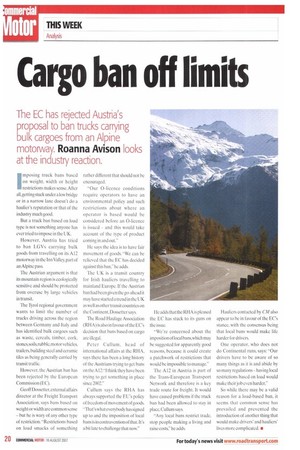Cargo ban off limits
Page 20

If you've noticed an error in this article please click here to report it so we can fix it.
The EC has rejected Austria's proposal to ban trucks carrying bulk cargoes from an Alpine
motorway. Roanna Avison looks
at the industry reaction.
Imposing truck bans based on weight, width or height restrictions makes sense. After all, getting stuck under a low bridge or in a narrow lane doesn't do a haulier's reputation or that of the industry much good.
But a truck ban based on load type is not something anyone has ever tried to impose in the UK.
However, Austria has tried to ban I.,GVs carrying bulk goods from travelling on its Al2 motorway in the Inn Valley, part of an Alpine pass.
The Austrian argument is that its mountain region is ecologically sensitive and should be protected from overuse by large vehicles in transit.
The Tyrol regional government wants to limit the number of trucks driving across the region between Germany and Italy and has identified bulk cargoes such as waste, cereals, timber, cork. stones,soils,rubble,motor vehicles, trailers, building steel and ceramic tiles as being generally carried by transit traffic.
However, the Austrian ban has been rejected by the European Commission (EC).
Geoff Dossetter,external affairs director at the Freight Transport Association, says bans based on weight or width are commonsense but he is wary of any other type of restriction. "Restrictions based on load smacks of something rather different that should not be encouraged.
"Our 0-licence conditions require operators to have an environmental policy and such restrictions about where an operator is based would be considered before an 0-licence is issued and this would take account of the type of product coming in and out."
He says the idea is to have fair movement of goods. "We can be relieved that the EC has decided against this ban," he adds.
The UK is a transit country for Irish hauliers travelling to mainland Europe. If the Austrian ban had been given the go-ahead it may have started a trend in the UK as well as other transit countries on the Continent, Dossetter says.
The Road Haulage Association (RHA) is also in favour of the EC's decision that bans based on cargo are illegal.
Peter Cullum, head of international affairs at the RHA, says there has been a long history of the Austrians trying to get bans on the Al 2:"I think they have been trying to get something in place since 2002."
Cullum says the RHA has always supported the EU's policy of freedom of movement of goods. "That's what everybody has signed up to and the imposition of local bans is in contravention of that. It's a bit late to challenge that now." He adds that the RHA is pleased the EC has stuck to its guns on the issue.
"We're concerned about the imposition of local bans, which may be suggested for apparently good reasons, because it could create a patchwork of restrictions that would be impossible to manage."
The A 1 2 in Austria is part of the Trans-European Transport Network and therefore is a key trade route for freight. It would have caused problems if the truck ban had been allowed to stay in place. Cullum says.
"Any local bans restrict trade, stop people making a living and raise costs," he adds. Hauliers contacted by CM also appear to be in favour of the EC's stance, with the consensus being that local bans would make life harder for drivers.
One operator, who does not do Continental runs, says: "Our drivers have to be aware of so many things as it is and abide by so many regulations having local restrictions based on load would make their job even harder."
So while there may be a valid reason for a load-based ban, it seems that common sense has prevailed and prevented the introduction of another thing that would make drivers' and hauliers' lives more complicated. •
























































































































































































